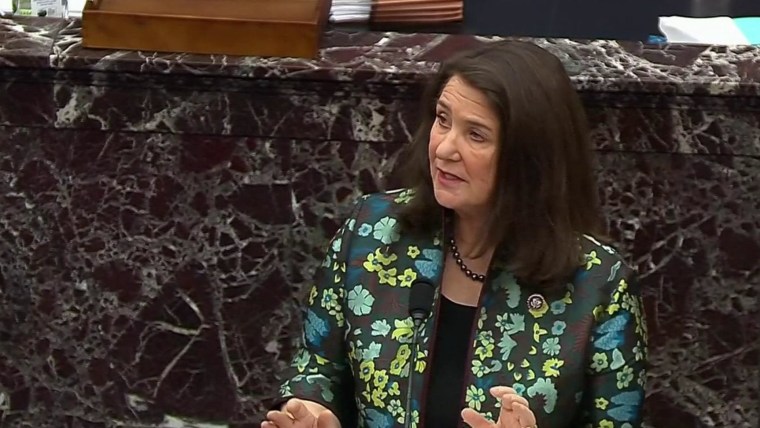WASHINGTON — Rep. Jamie Raskin, the lead House impeachment manager, brought the Senate prosecution of former President Donald Trump to a close Thursday with what he framed as the final remaining question for the jury of lawmakers.
"If a president did incite a violent insurrection," the third-term Maryland Democrat asked, "would that be a high crime and misdemeanor?" His answer, of course, is yes.
For two days, Raskin and his team of House Democrats tried to demonstrate that Trump fashioned the lie he had been robbed in November's presidential election; told a group of his supporters to fight before they stormed the Capitol on Jan. 6; and encouraged them, rather than calling them off, during the deadly attack. The evidence of all three — including new video and audio recordings played Wednesday — was compelling.
But if the first day of the prosecution was about appealing to Republicans' self-interest, Thursday's was about putting the riot in context of the past and the future — of the foundations and fortitude of a political system that relies on votes, rather than force.
The basic message: Republican senators put the republic at risk if they vote to acquit.
"This must be our wake-up call," Rep. Diana DeGette, D-Colo., told the Senate. "We must condemn it because the threat is not over.”
What is left for the Senate to decide, as Trump's lawyers mount their defense Friday, is whether the former president's conduct demands his conviction and disqualification from future office. Senators can use any standard they want. There are no jury instructions in an impeachment trial, one of the many ways it differs from a criminal trial.
As lawmakers know, it is easier to find reasons to vote against a proposal than to vote for it. And Trump loyalists in the Senate have identified several reasons to acquit the former president, from the belief that the proceeding is unconstitutional to the view that House managers failed to make the case that Trump incited the riot.
"They have not demonstrated that the president's conduct satisfies the legal standard of high crimes and misdemeanors," Sen. Ted Cruz, R-Texas, said. "The House managers focused a great deal on the president, using words like 'fight' or 'fight like hell.' Well, if that constitutes incitement, then every single political candidate in America is guilty of incitement."
There are, of course, easy logical counters to these arguments. The other political candidates did not organize a rally outside the White House that was based on the lie of a stolen election, or promise to accompany the crowd to the Capitol and then continue to support its actions as police and federal officials came under attack.
On the question of the constitutionality of the Senate convicting a former president, the Senate has already voted in favor of the impeachment trial falling within its jurisdiction. A juror in a criminal court is expected to judge the facts of the case, not the judges' pre-trial motions.
It would take 67 votes — all 50 Democrats and at least 17 Republicans — for the Senate to convict Trump and bar him from holding future office. House Democratic managers understand that is a high bar at a time when the nation is deeply polarized, and Trump remains the exclusively dominant force in the Republican Party.
And yet, Democrats asked Republicans to think about the precedent they would set for future presidents by acquitting Trump. They framed that point around the possibility that another defeated president would rally supporters to attack Congress.
"If President Trump's lawyers endorse his breathtaking assertion that his conduct inciting these events was totally appropriate, and the Senate acquits Donald Trump, then any president could incite and provoke insurrectionary violence against us again," Rep. Joe Neguse, D-Colo., said. "If you don't find this a high crime and misdemeanor today, you have set a new, terrible standard for presidential conduct in the United States of America."
Democrats used the voices of Republicans — via video recording — to help finish off their case that Trump's conduct threatened the country's stability in January. They played news clips of several GOP governors harshly criticizing Trump for imperiling Congress and then-Vice President Mike Pence, whom the rioters were trying to find in the building that day.
But in the end, the prosecutors turned to history, citing the concepts of the framers of the Constitution and other champions of the republican form of governance.
Raskin quoted Thomas Paine, author of "Common Sense" and "The American Crisis," in an exhortation to Republicans to consider both Trump's specific acts and their context.
"Exercise your common sense about what just took place in our country," he said, before adding a quotation from Paine that might encourage them to take a broader view of their votes: "Tyranny, like hell, is not easily conquered; yet we have this consolation with us, that the harder the conflict, the more glorious the triumph."
There is no doubt that Raskin preached to the choir of Trump critics in the Senate and outside it. But his team faces an uphill battle in convincing 17 Republicans that the big question is whether incitement to insurrection — the thrust of the article of impeachment — meets the constitutional threshold of "high crimes and misdemeanors."
He suggested the obvious answer is yes.
"Can we all agree, at least, on that?" he asked.
Probably not.
"case" - Google News
February 12, 2021 at 09:46PM
https://ift.tt/3plOFdu
Democrats rest case with a warning: Republicans risk the republic if they acquit Trump - NBC News
"case" - Google News
https://ift.tt/37dicO5
https://ift.tt/2VTi5Ee
Bagikan Berita Ini















0 Response to "Democrats rest case with a warning: Republicans risk the republic if they acquit Trump - NBC News"
Post a Comment